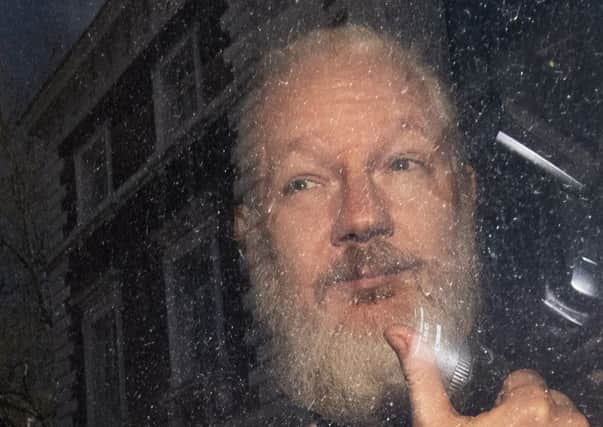Brian Wilson: Assange’s arrest raises profound questions about free speech


Long ago, I was on the first postgraduate journalism course in the UK, run by Tom Hopkinson. Long before that, he had been editor of Picture Post, a hugely influential magazine in shaping the post-war agenda.
In 1950, Tom sent two great names in British journalism, James Cameron and the photographer Bert Hardy, to report on the Korean War. One of their dispatches revealed atrocities against prisoners by Korean soldiers with American connivance.
Advertisement
Hide AdAdvertisement
Hide AdIt was a huge scoop and the presses were ready to roll when the proprietor, Sir Edward Hulton, ordered them to be stopped. Hulton liked the profits generated by Picture Post but not its politics. When Tom refused to back down, he was branded a fellow-traveller, sacked and scarcely worked again in British newspapers.
I was reminded of all that by the controversy over Julian Assange’s detention and future prospects. Just as Hopkinson knew that, once he had the story and damning images, they must be published, so too did Assange when footage emerged of serious misdeeds by US troops in Iraq, which included shooting two Reuters journalists.
So far, so straightforward. A primary duty of the media is to expose wrongdoing. Some of the world’s most respected newspapers queued up to help disseminate the half million documents Chelsea Manning fed to Assange while adding the rider that Wikileaks “was not involved in the news organizations’ research, reporting, analysis and writing”.
Assange himself showed little interest in such refinements. He published the lot. However, while breaking into computers in order to extract vast tranches of indiscriminate information is doubtless a highly skilled calling, it isn’t journalism. Neither is dumping the stolen material without context, verification, discretion or consideration of implications.
These distinctions are important in the current context and will be debated at great length in courtrooms on both sides of the Atlantic. The question of whether Assange should be extradited to the United States might hang largely on what he is going to be charged with when he gets there – hacking or something much more serious?
He would clearly prefer not to cross the Atlantic at all but you can hardly blame the US law enforcement agencies for taking a different view in this case. No government can ignore the fact that its innermost secrets have been stolen and any politician who suggests otherwise should think through the implications for their own potential responsibilities. J Corbyn, please note.
Equally, it should not be assumed that extradition would lead Assange into the unforgiving hands of a judicial lynch-mob. America takes its constitution seriously and the First Amendment – which asserts freedom of speech and of the press – is fiercely protected.
An article in yesterday’s New York Times pointed out that the question of whether publishing government secrets can be a crime has never been tested in court. That seems remarkable and makes their reluctance to go near the First Amendment considerably more respectful of media freedoms than our own Official Secrets Act.
Advertisement
Hide AdAdvertisement
Hide AdAs a man who likes the spotlight, Assange seems assured of a further prolonged period under its glare. The implications are profound – for press freedom but also for the rights of any organisation or individual to protect confidentiality in the age of electronic communication. Or can any information thief create a defence by calling himself or herself a journalist?
Assange could scarcely have failed to understand the seriousness of what he was involved in. It would have been better if he had faced the consquences long ago and had his day in court. It is also worth remembering that the reasons he was arrested in London once Ecuador’s patience finally expired had nothing to do with hacking or extradition. That comes next.
In case you are wondering what happened to Tom Hopkinson after he was sacked from Picture Post, he didn’t go into hiding. Instead, he went to South Africa and edited the black magazine Drum which played a heroic part in the struggle against apartheid. Real journalist, great man.